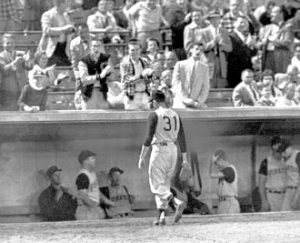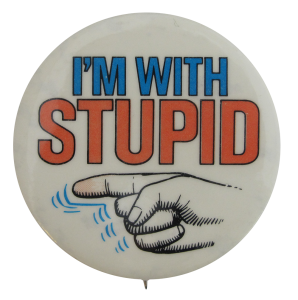by Kelly Riggs
Nobody is perfect every single time.
Bet on it. No matter how successful you are in sales, you’re going to come out on the losing side now and then.
The fact is, you can be absolutely perfect all the way to the bitter end and the perfect opportunity can still slip away. It’s like getting that beautiful 6-pound bass all the way to the boat, but failing to get it in the net before the line breaks.
It happens.
Ask Harvey Haddix. (Thanks to my good friend, Bob Terson, for sharing this story with me.)
On May 26, 1959, the Pittsburgh Pirates’ left-hander pitched a perfect game – and lost. Facing a formidable line-up of the Milwaukee Braves (including future Hall-of-Famer Hank Aaron, who was batting .453 at the time), Haddix threw nine innings of perfect baseball.
27 batters. No hits, no walks, and no runs.
However, the Pirates offense didn’t produce any runs either. So, for the first and only time in MLB history, a “perfect game” went to extra innings.
And the mastery continued. Haddix was still perfect after 10 innings.
And 11 innings.
And 12 innings.
Haddix had completed an astounding 36 at-bats without a single mistake, but the Pirates had still failed to score a run.
Finally, in the 13th inning, the magic ended. The Braves put a man aboard on a Pirates’ throwing error, and three batters later, Haddix gave up the game-winning hit.
Haddix had pitched 12 perfect innings of baseball – a feat that had never been accomplished in the history of the game, and has never been repeated – and he LOST. Some experts consider the performance to be a more significant accomplishment than Don Drysdale’s perfect game in the 1956 World Series.
But after the game, when asked, “Do you realize what you just did?”, Haddix answered this way:
“Yeah, but I lost the damn game. I’d rather have given up six hits and won. I didn’t go out there to lose.”
But I lost the game.
Not my team. It was me. I lost the game, Haddix said.
No excuses. No blame. No whining.
That, my friend, is the hallmark of a professional. He or she realizes that the only way to improve performance is to take responsibility, to be introspective.
And selling is like that sometimes; a great opportunity gets away. Despite a game-winning strategy and strong execution, we lose the sale.
We certainly don’t like it, but we move on.
But it’s the other end of the spectrum that really bothers me. When I see average salespeople make the same mistakes over and over without seeming to learn anything, it makes me crazy.
They don’t make adjustments. They don’t change tactics. They don’t improve. (Read Dave Brock’s excellent post on this topic.)
Instead, they find excuses.
What they need is a t-shirt that says, “I’M INSANE!” (You know…doing the same thing over and over…)
And, if you’re that person’s sales manager, it might be that you’re insane, too. If you’re standing around letting the madness continue, you’re part of the problem. But that’s another post.
If this sounds even vaguely like you (or one of your salespeople), let’s make a move towards solving this problem. Here are three concrete steps to help you gain control of your sales success:
First, stop making excuses.
There is nothing that screams mediocrity more than than an excuse-maker.
Don’t blame circumstances, and don’t put it off on something or someone else. The reason is simple – extending blame prevents you from looking at the things you could’ve done differently.
Think about this: despite the lack of run support, Haddix was still in control of his own destiny in the 13th inning. We may not enjoy looking at it that way, but that’s the only way to achieve your potential.
And, by the way, you probably make excuses to your customers when your company fails in some way. Just so you you know – they hate excuses, too.
Second, learn to debrief critically, whether you lose OR win.
It’s so easy to look at any particular sporting event and blame the outcome on a single play at the end. This past weekend, the Oklahoma Sooners (yeah, I’m a fan) advanced to the Sweet 16 with a 72-66 win over Dayton. If you didn’t watch the game, you might not know that the Sooners trailed the Flyers by nine points with just 13 minutes to play.
If the Sooners had lost, it would have been easy to point to a late-game miss or the fact that Dayton was essentially playing in front of a home crowd (an 11-seed playing at home?), but they would have conveniently forgotten a couple of key points. During a 12-0 Dayton run, OU missed 6 lay-ups (yes, six) and turned the ball over twice on offensive fouls.
Important to know.
So, make sure you review the entire sales process – again, whether you win OR lose. What did you do well (and need to replicate)? What did you miss (and need to change)? Did you qualify the opportunity well? Did you understand the buying motivations? Did the competition have better intel?
Did you miss a couple of lay-ups early on?
Finally, integrate the new information into your sales process.
It’s not the worst thing in the world to lose a sale (although it might be close). The worst thing you can do – the most stupid thing you can do – is make the same mistake twice. You have to take what you learn and make real behavioral changes. If you think you need to change up your marketing technique from digital to traditional, maybe a a direct mail fulfilment company can help get that done. But you need to understand what you lack and what are the areas you can fix first!
So, do you think your discovery questions are lame? Find new ones. Are you missing out on buying influence? Double-check the organization structure. Is your sales presentation flat? Take more time to understand the client’s business.
You get the idea. Make changes, and then monitor the results.
Stop the insanity. Stop blaming others for your results. Do what average people never do.
Kelly Riggs is a business performance coach and founder of the Business LockerRoom. A former national Salesperson of the Year and serial entrepreneur, Kelly is a recognized thought leader in the areas of sales, management leadership, and strategic planning. He serves clients ranging from small, privately held companies to Fortune 500 firms. Kelly has written two books: “1-on-1 Management™: What Every Great Manager Knows That You Don’t” and “Quit Whining and Start SELLING! A Step-by-Step Guide to a Hall of Fame Career in Sales.”